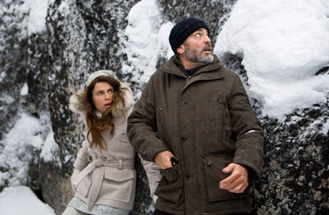|
|
Movie Review: The AmericanBy Matthew HuntleySeptember 9, 2010
Despite their slow pace, lack of a distinct soundtrack and minor camera movement, the gun assembly scenes are completely engrossing. It could just be the type of work involved or the underlying sense of danger that comes knowing the gun will probably be used by someone, but regardless, these scenes always contain tension and are strangely mesmerizing. We know who the gun is for but we don’t know who it’s supposed to kill, if anyone. Then there’s the dynamic scene when Mathilde actually tests the gun, which is filmed beautifully (and ironically) alongside a stream. Everything about this scene makes it look calm and serene but it still manages to generate an unnerving effect, probably because of what the characters are actually doing. It reminded me of a thriller that might have come out in the 1970s, back when the style of cinema focused on observation and people rather than effects and stunts. The emotional side of the story forms after Jack visits a brothel and becomes infatuated with a prostitute named Clara (Violante Placido). For Jack, their relationship becomes all the more meaningful when he realizes he may be able to trust her and she could possibly heal his incessant paranoia and isolation. They share a tender moment in a coffee shop when he asks her if they can meet at their usual spot, to which she asks, “What usual spot?” Notice the look of surprise on Jack’s face and the glimmer of hope on Clara’s. Rowan Joffe’s screenplay, adapted from the novel by Martin Booth, includes another strong relationship between Jack and a local priest (Paolo Bonacelli), who sees in Jack a tortured soul he wants to save. They have a conversation in the park that lifts the priest character to whole other level and confirms the film is not interested in turning its characters into archetypes. It sees each of them beyond their superficial qualities. The American was directed by Anton Corbijn, who last made the powerful Control (2007), which was one of its year’s best films. Corbijn, best known for his music videos, reaffirms himself as a major feature director. He’s drawn to films that closely observe lonely characters in their own unique environments, which the characters don’t always believe is their own. He creates a tone that’s constantly building towards something, and although we’re not always sure what that is, the anticipation we feel is unique because it’s not the traditional edge-of-your-seat kind; it’s more subtle and Corbijn is careful not to release the tension too early. It just keeps building until the timing is perfect. I would like to say the film is flawless, but there was one instance where it missteps. It involves a chase sequence through the Italian village, which was adequate, but I felt the film was above it. I think it would have been more daring to simply introduce the possibility of a chase scene and not actually cash in on it. This would have made the climax more distinct (as far as the action goes) and obviated the need for a standard sound cue that gets used twice. But this is just minor note in an otherwise superb thriller. I was surprised how involved I became in (and how sympathetic I grew towards) the main character’s life, and in such a short amount of time. It’s amazing how much you can learn about people just by watching them work.
|

|
|
|

|
Thursday, October 31, 2024
© 2024 Box Office Prophets, a division of One Of Us, Inc.


